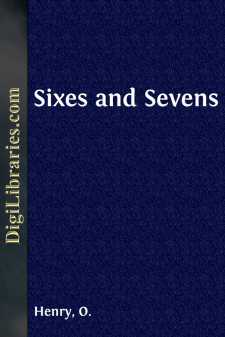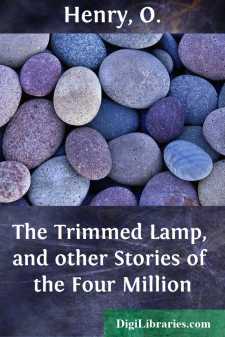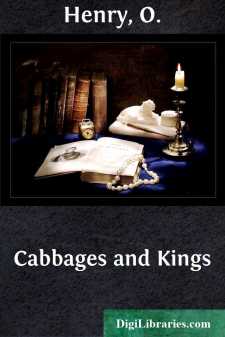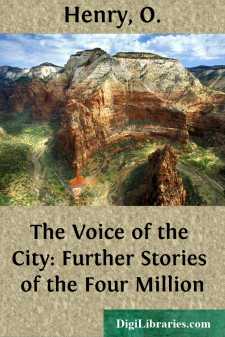Categories
- Antiques & Collectibles 13
- Architecture 36
- Art 48
- Bibles 22
- Biography & Autobiography 813
- Body, Mind & Spirit 142
- Business & Economics 28
- Children's Books 14
- Children's Fiction 11
- Computers 4
- Cooking 94
- Crafts & Hobbies 4
- Drama 346
- Education 46
- Family & Relationships 57
- Fiction 11828
- Games 19
- Gardening 17
- Health & Fitness 34
- History 1377
- House & Home 1
- Humor 147
- Juvenile Fiction 1873
- Juvenile Nonfiction 202
- Language Arts & Disciplines 88
- Law 16
- Literary Collections 686
- Literary Criticism 179
- Mathematics 13
- Medical 41
- Music 40
- Nature 179
- Non-Classifiable 1768
- Performing Arts 7
- Periodicals 1453
- Philosophy 64
- Photography 2
- Poetry 896
- Political Science 203
- Psychology 42
- Reference 154
- Religion 513
- Science 126
- Self-Help 84
- Social Science 81
- Sports & Recreation 34
- Study Aids 3
- Technology & Engineering 59
- Transportation 23
- Travel 463
- True Crime 29
O. Henry
O. Henry, the pen name of William Sydney Porter, was an American short story writer renowned for his witty narratives and twist endings. Born on September 11, 1862, in Greensboro, North Carolina, he worked in various professions before turning to writing, including as a pharmacist, draftsman, bank teller, and journalist. His best-known works include "The Gift of the Magi" and "The Ransom of Red Chief," which showcase his trademark style of irony and clever plot twists.
Author's Books:
Sort by:
by:
O. Henry
THE LAST OF THE TROUBADOURS Inexorably Sam Galloway saddled his pony. He was going away from the Rancho Altito at the end of a three-months' visit. It is not to be expected that a guest should put up with wheat coffee and biscuits yellow-streaked with saleratus for longer than that. Nick Napoleon, the big Negro man cook, had never been able to make good biscuits. Once before, when Nick was...
more...
by:
O. Henry
THE RED ROSES OF TONIA A trestle burned down on the International Railroad. The south-bound from San Antonio was cut off for the next forty-eight hours. On that train was Tonia Weaver's Easter hat. Espirition, the Mexican, who had been sent forty miles in a buckboard from the Espinosa Ranch to fetch it, returned with a shrugging shoulder and hands empty except for a cigarette. At the small...
more...
by:
O. Henry
INTRODUCTION This the twelfth and final volume of O. Henry's work gets its title from an early newspaper venture of which he was the head and front. On April 28, 1894, there appeared in Austin, Texas, volume 1, number 3, of The Rolling Stone, with a circulation greatly in excess of that of the only two numbers that had gone before. Apparently the business office was encouraged. The first two...
more...
by:
O. Henry
THE TRIMMED LAMP Of course there are two sides to the question. Let us look at the other. We often hear "shop-girls" spoken of. No such persons exist. There are girls who work in shops. They make their living that way. But why turn their occupation into an adjective? Let us be fair. We do not refer to the girls who live on Fifth Avenue as "marriage-girls." Lou and Nancy were chums....
more...
by:
O. Henry
It is characteristic of this buoyant people that they pursue no man beyond the grave. "Let God be his judge!"âEven with the hundred thousand unfound, though greatly coveted, the hue and cry went no further than that. To the stranger or the guest the people of Coralio will relate the story of the tragic end of their former president; how he strove to escape from the country with the public...
more...
by:
O. Henry
X THE UNKNOWN QUANTITY The poet Longfellow—or was it Confucius, the inventor of wisdom?—remarked: "Life is real, life is earnest; And things are not what they seem." As mathematics are—or is: thanks, old subscriber!—the only just rule by which questions of life can be measured, let us, by all means, adjust our theme to the straight edge and the balanced column of the great goddess...
more...
by:
O. Henry
I Twenty-five years ago the school children used to chant their lessons. The manner of their delivery was a singsong recitative between the utterance of an Episcopal minister and the drone of a tired sawmill. I mean no disrespect. We must have lumber and sawdust. I remember one beautiful and instructive little lyric that emanated from the physiology class. The most striking line of it was this:...
more...
by:
O. Henry
THE LOVE-PHILTRE OF IKEY SCHOENSTEIN The Blue Light Drug Store is downtown, between the Bowery and First Avenue, where the distance between the two streets is the shortest. The Blue Light does not consider that pharmacy is a thing of bric-a-brac, scent and ice-cream soda. If you ask it for pain-killer it will not give you a bonbon. The Blue Light scorns the labour-saving arts of modern pharmacy. It...
more...
by:
O. Henry
"THE ROSE OF DIXIE" When The Rose of Dixie magazine was started by a stock company in Toombs City, Georgia, there was never but one candidate for its chief editorial position in the minds of its owners. Col. Aquila Telfair was the man for the place. By all the rights of learning, family, reputation, and Southern traditions, he was its foreordained, fit, and logical editor. So, a committee of...
more...
by:
O. Henry
ROADS OF DESTINY I go to seek on many roadsWhat is to be.True heart and strong, with love to light—Will they not bear me in the fightTo order, shun or wield or mouldMy Destiny? Unpublished Poems of David Mignot. The song was over. The words were David's; the air, one of the countryside. The company about the inn table applauded heartily, for the young poet paid for the wine. Only the notary,...
more...











